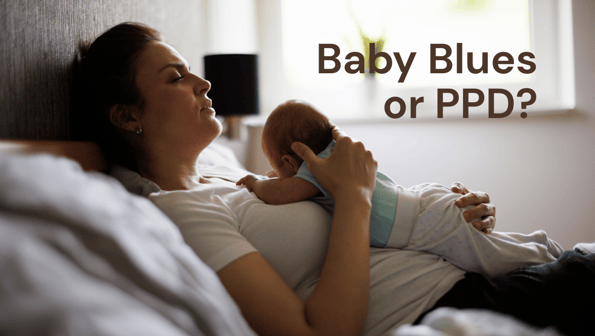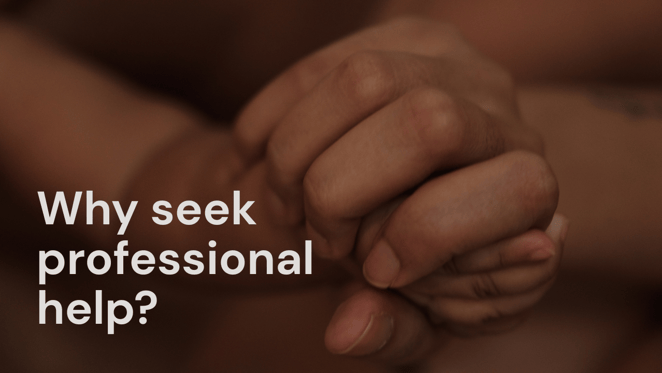How Is PPD Different from the Baby Blues?
6/6/20254 min read
The arrival of a newborn often brings a whirlwind of emotions—joy, awe, and love mingled with stress, sleepless nights, and overwhelming responsibility. Amid these fluctuating feelings, many new mothers experience mood changes that range from tearfulness to irritability. But how do we distinguish between normal emotional adjustment and something more serious?
This is where understanding the difference between the “baby blues” and postpartum depression (PPD) becomes essential. Though they may initially appear similar, these two conditions differ significantly in duration, severity, and impact on a mother’s mental health. Clarifying this distinction not only helps women better understand what they’re going through—it also ensures they receive the appropriate care at the right time.
At Peace Temple, we see firsthand how confusion around these conditions can delay necessary intervention. This article will walk you through the key differences and offer insight into when to seek help.


What Are the Baby Blues?
The “baby blues” refer to a temporary, mild emotional dip that affects up to 80% of new mothers within the first few days after childbirth. It’s not a mental illness, but rather a normal adjustment period as the body and brain recalibrate after delivery.
Common Symptoms of the Baby Blues:
Tearfulness or crying for no clear reason
Mood swings and irritability
Anxiety or restlessness
Difficulty sleeping (even when the baby is asleep)
Feeling overwhelmed
Reduced concentration or forgetfulness
These symptoms typically start within 2 to 3 days postpartum and peak around the fourth or fifth day. The crucial distinction is that the baby blues usually resolve on their own within 10 to 14 days without the need for medical treatment.
During this time, emotional support, proper rest, and reassurance can work wonders. At Peace Temple, we often recommend that loved ones focus on practical help—preparing meals, watching the baby, and offering emotional comfort—to give the mother space to recover.
What Is Postpartum Depression (PPD)?
Unlike the baby blues, postpartum depression is a clinical mood disorder that affects approximately 1 in 7 mothers, and its symptoms are more intense, persistent, and impairing. It can develop within weeks of childbirth or even several months later.
PPD often doesn’t go away on its own and typically requires professional treatment, which may include therapy, medication, or a combination of both.
Key Symptoms of Postpartum Depression:
Persistent sadness, hopelessness, or emptiness
Loss of interest in previously enjoyable activities
Difficulty bonding with the baby
Feelings of guilt, shame, or worthlessness
Severe anxiety or panic attacks
Changes in appetite and sleep patterns (beyond new born-related disruption)
Thoughts of harming oneself or the baby (in extreme cases)
Difficulty functioning in daily life
These symptoms can last weeks or even months and often interfere with a mother’s ability to care for herself and her child.
If you're unsure whether what you're feeling is PPD or just baby blues, Peace Temple’s team of postpartum therapists can guide you through a proper assessment and help determine the best course of support.
Duration and Intensity: A Critical Difference
Perhaps the most telling difference between the baby blues and PPD is how long the symptoms last and how deeply they affect day-to-day life.


Emotional Depth and Thought Patterns
Another subtle difference lies in the emotional experience itself. While the baby blues may involve weepiness or nervousness, PPD can carry a deeper emotional weight - a sense of despair, isolation, or failure.
Women with PPD often describe feeling numb, emotionally detached, or as though they are simply “going through the motions.” In contrast, baby blues tend to ebb and flow, with many women still finding moments of joy or connection.
Moreover, intrusive thoughts—such as imagining harm befalling the baby or fearing they are an unfit mother—are more likely in postpartum depression. These thoughts can be frightening and are a red flag that support is needed immediately. Peace Temple’s clinical team is trained to help mothers navigate such experiences with compassion and without judgment.
Risk Factors for Developing PPD
While the baby blues can affect virtually any mother, PPD is more likely if certain risk factors are present:
Personal or family history of depression or anxiety
Lack of emotional or practical support
Traumatic childbirth or complications
Financial stress or relationship strain
History of miscarriage or infant loss
Sleep deprivation or chronic fatigue
Unmet expectations about motherhood
Awareness of these risk factors can help new mothers and their families stay vigilant. Early intervention makes a significant difference in recovery, and Peace Temple offers tailored postpartum programs designed for high-risk individuals.
Why It Matters to Differentiate the Two
Failing to distinguish between the baby blues and PPD can result in delayed treatment, increased emotional suffering, and even long-term complications for both mother and child. While the baby blues tend to resolve naturally, PPD can worsen if ignored.
Babies of mothers with untreated PPD may show signs of developmental delays or attachment difficulties. The ripple effect of untreated maternal mental health issues can touch every corner of a household.
This is why it’s crucial to not only recognize the signs but to feel empowered to seek help. No mother should feel ashamed of struggling postpartum. Mental health deserves the same care and urgency as physical recovery after childbirth.
At Peace Temple, we believe that maternal wellness is foundational to family wellness—and we’re here to help mothers feel whole again.
When and Where to Seek Help
If you or someone close to you is still experiencing significant emotional distress more than two weeks after childbirth—or if symptoms are severe at any point—don’t wait. Reach out for support.
Here’s when to contact a professional:
Emotional lows last longer than two weeks
Bonding with the baby feels difficult or absent
Feelings of dread, guilt, or panic are overwhelming
Thoughts of self-harm or harming the baby arise
Peace Temple’s postpartum care team offers therapy sessions, emotional wellness programs, and online consultations tailored to meet new mothers where they are—no pressure, no labels, just healing.
Final Thoughts: It's Okay to Ask for Help
The early days of motherhood are beautiful, messy, and emotionally complex. Feeling weepy after delivery is often part of the package—but if those feelings linger or darken, it's essential to look deeper.
Knowing the difference between the baby blues and postpartum depression empowers women to speak up, seek support, and reclaim their sense of self. With timely care, healing is not just possible—it’s probable.
At Peace Temple, we’re not just advocates of maternal mental health—we’re active companions on the journey toward emotional well-being.
Because when mothers thrive, families flourish.
